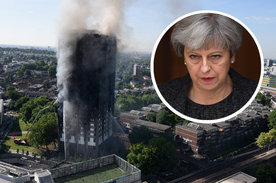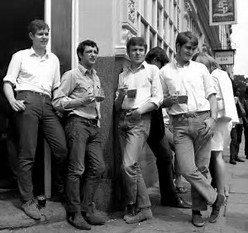
One of the nastier developments in the media over the last few years has been the insidious attempt to force all politicians to have the same personality, expressing their emotions in the obligatory media-conscious way. The latest victim of this Orwellian nonsense has been Theresa May, someone with whom I have not felt a great deal of sympathy until now. Over the last few weeks she has been the subject of a thoroughly vicious and dishonest campaign largely because she has not always publicly worn her heart on her sleeve during the string of recent disasters and tragedies, even though those who have had dealings with her, not all from the same political caste, have testified that she has been deeply moved. I sympathise with her because I know where she is coming from. I have sometimes been accused of being diffident and shy myself. It’s true that my own emotions are often understated, but believe me they are there, and I don’t think they are any the less for not being on show, in fact the opposite might be the case.
One thing I have in common with Theresa May is that I am from a very ‘English’ background, had a fairly typical English education and, while my father was not a vicar like hers, I am from a churchy sort of background. While I now lean more towards agnosticism, I would be the first to admit that those early influences have left their mark on me as early influences do on everyone, regardless of their background. While humour most certainly played a part in that background, and I have fairly good relations with a diverse assortment of people, there are some things I have never learned to do convincingly and so I avoid them, as to get it wrong can simply make it look like a parody. I will laugh and joke with anyone, but I can’t really do ‘high fives’ and I can’t visualise Mrs May doing them either. Shaking hands was the way we greeted people, and it is neither superior nor inferior to any other way.
The problem with forcing a media-expected way of showing emotions onto everyone is that everything becomes a façade, and that means a person’s merit may be judged largely on their acting ability. It also means that politicians will be inclined to put photo opportunities and other shallow gestures above more practical actions. What on earth is the good of a politician (and the attendant media circus) turning up and getting in the way when the fire, police and ambulance services are trying to get on with the urgent job in hand? Better to visit the injured in hospital a little later when they are in a position to appreciate the visit. This is what Theresa May did, on advice from the security and emergency services, yet she became the butt of one of the nastiest and most irrational personal campaigns I can recall in recent years. This campaign may well rebound on those who organised it, as the political opportunism was all too obvious, and people will judge for themselves who exactly has been better at the ‘gentler, kinder politics’ Mr Corbyn somewhat ironically spoke of a little while ago.
It’s not only in politics that this showy and sometimes unconvincing way of displaying emotion has crept up on us. Although not always in front of a camera, some people, especially younger ones, are influenced by the images they have seen on TV and social media. Up until twenty or thirty years ago, for example, school students would go on a set day in July or August to collect their GCSE results (roughly 16-year-olds for those of not familiar with UK exams) and A-level results (mainly 18-19 year olds – these results being the important ones for getting into university). They would go along, look at their results, some would be happy and some sad and congratulations or commiserations would be exchanged. But then the media got hold of it and this has led to an entire personality change among older teenagers. With cameras there, a new tradition of dramatic tears, histrionic hugging and general hysteria was born. In the first few years it was probably when local TV was there to record the event, but later it somehow became the way they thought they were supposed to behave. Now with Facebook and other media this hysteria is on another level again.
Of course, it may be assumed that I’m a bitter old fart (which I am), jealous because I did not have all that touchy-feely stuff in my day. Yet although it wasn’t as often, we did have those moments. It’s just that when they came, they came because there was a reason for us, and you knew instinctively when those moments were. Doing it for a camera or when getting your exam results was not one of them (except for the most extreme fails). We just went to the pub.
One thing I have in common with Theresa May is that I am from a very ‘English’ background, had a fairly typical English education and, while my father was not a vicar like hers, I am from a churchy sort of background. While I now lean more towards agnosticism, I would be the first to admit that those early influences have left their mark on me as early influences do on everyone, regardless of their background. While humour most certainly played a part in that background, and I have fairly good relations with a diverse assortment of people, there are some things I have never learned to do convincingly and so I avoid them, as to get it wrong can simply make it look like a parody. I will laugh and joke with anyone, but I can’t really do ‘high fives’ and I can’t visualise Mrs May doing them either. Shaking hands was the way we greeted people, and it is neither superior nor inferior to any other way.
The problem with forcing a media-expected way of showing emotions onto everyone is that everything becomes a façade, and that means a person’s merit may be judged largely on their acting ability. It also means that politicians will be inclined to put photo opportunities and other shallow gestures above more practical actions. What on earth is the good of a politician (and the attendant media circus) turning up and getting in the way when the fire, police and ambulance services are trying to get on with the urgent job in hand? Better to visit the injured in hospital a little later when they are in a position to appreciate the visit. This is what Theresa May did, on advice from the security and emergency services, yet she became the butt of one of the nastiest and most irrational personal campaigns I can recall in recent years. This campaign may well rebound on those who organised it, as the political opportunism was all too obvious, and people will judge for themselves who exactly has been better at the ‘gentler, kinder politics’ Mr Corbyn somewhat ironically spoke of a little while ago.
It’s not only in politics that this showy and sometimes unconvincing way of displaying emotion has crept up on us. Although not always in front of a camera, some people, especially younger ones, are influenced by the images they have seen on TV and social media. Up until twenty or thirty years ago, for example, school students would go on a set day in July or August to collect their GCSE results (roughly 16-year-olds for those of not familiar with UK exams) and A-level results (mainly 18-19 year olds – these results being the important ones for getting into university). They would go along, look at their results, some would be happy and some sad and congratulations or commiserations would be exchanged. But then the media got hold of it and this has led to an entire personality change among older teenagers. With cameras there, a new tradition of dramatic tears, histrionic hugging and general hysteria was born. In the first few years it was probably when local TV was there to record the event, but later it somehow became the way they thought they were supposed to behave. Now with Facebook and other media this hysteria is on another level again.
Of course, it may be assumed that I’m a bitter old fart (which I am), jealous because I did not have all that touchy-feely stuff in my day. Yet although it wasn’t as often, we did have those moments. It’s just that when they came, they came because there was a reason for us, and you knew instinctively when those moments were. Doing it for a camera or when getting your exam results was not one of them (except for the most extreme fails). We just went to the pub.


 RSS Feed
RSS Feed